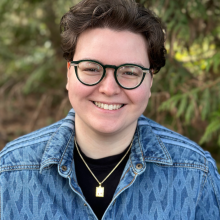Kayla McIntyre
Why did you decide to pursue a graduate degree?
I always knew I loved performance. I had a lot of questions about the different modes of it and knew continuing to a graduate level would help me focus on my passions and areas of interest.
Why did you decide to study at UBC?
Having done half of my undergrad here, I felt there was still so much to learn. I adored all of the classes that I wanted to take more! I felt that I needed more perspective concerning the production side of theatre, there were a plethora of opportunities that pushed me outside of my comfort zone and overall shaped my artistic practice.
What is it specifically, that your program offers, that attracted you?
The community. I am so deeply grateful to the generous mentorship and kindness of the department's faculty members and my peers for their continued support and enthusiasm. It is so inspiring to be surrounded every day by people who share your passion, challenge you, and cheer you on.
What was the best surprise about UBC or life in Vancouver?
The wildlife! I love raccoons, so it makes my heart very happy to see them roaming around from time to time! I enjoy walking around and taking in the gorgeous landscape. I love to visit the beach and just watch the water flow.
What aspects of your life or career before now have best prepared you for your UBC graduate program?
A lot of what I wanted to study intersected with my life experience and previous employment. I am so appreciative that I have been afforded some incredible opportunities based on those experiences that have informed my approach to theory and application.
What advice do you have for new graduate students?
Breathe. Know your limits and advocate for yourself; you know yourself better than anyone else so remember to recharge and relax. It can often seem fast-paced, so take this opportunity to engage with your community and build meaningful relationships.
Learn more about Kayla's research
A discourse I am building upon in this project revolves around the idea of role-playing narratives being a mode of self-reflexivity and, in tandem, a means of socialization for the queer community. Through this lens, anything can be explored — gender identity, play on gender norms, expression, relations and power. I am driven to elaborate on constructing community and belonging through understanding the role gender and sexuality play in tabletop role-playing games. What I seek answers to are: how does an actor’s self-reflexivity inform performance or in-scene choices (in gameplay), how are gender and sexuality explored through character study, how does in-game mirroring (be that intentional or not) translate from “reality” and identity to game performance and how are these accounted for in the production of theatre of the mind?
